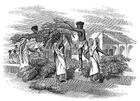
Over the last five centuries, the world has come to know Europeans as voracious consumers of colonial products. Right from the beginning of the 'European encounter', systems of production in the Americas, Africa and Asia adapted to the opening up of new markets. In many places this meant the establishment of completely new systems. The social and economic implications of these changes for the historical development of societies in the South continue to be highly contested.
The contribution of the research programme 'Working for the World' is a comparative approach to labour relations during the past 200 years. We look at the production of five important agricultural products and the ways in which they were processed for consumers in far-away markets. The products are: sugar, cotton, tobacco, indigo and jute. Up to the 19th century, these were supplied mostly by producers in the Americas but a series of events (the end of the slave trade, abolition, the US civil war) prompted a relocation to Asia. For this reason our comparisons concentrate on Asia: sugar and tobacco in Java, cotton and oil in Central Asia, indigo and jute in India.
The focal point of the research programme is the changing labour relations that made these production systems possible. Through the prism of labour, we look at four wider concerns:
- How was production for far-flung markets made possible? How was labour harnessed locally? What were the ecological, social and political limitations?
- How was labour employed at different stages of production, or at different levels of the 'commodity chain'?
- How, and why, did production systems come to an end, and what did this mean for labourers involved in them?
- What were the implications of market-oriented agricultural production for everyday life? And for longer-term social organisation?
An important aspect of the research programme is how comparisons can help us understand these local processes better. We will compare between commodities, between alternative systems producing the same commodity, between different historical phases, and between historiographical traditions and concepts. In all these comparisons our main concern is with labour relations, labour markets and the living strategies of families and communities working for the world.
Programme Coordinator: Dr. Ratna Saptari
